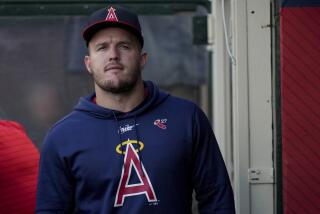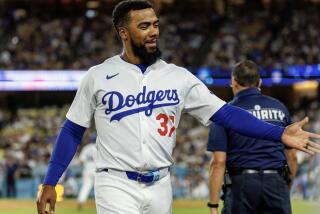Yasiel Puig fuels All-Star debate
There wasn’t much room for debate at Dodger Stadium on a recent summer evening.
Not among the people who came out early to watch Yasiel Puig take batting practice. Not among those who wore T-shirts with the rookie’s name and number.
Dodgers fans seemed confident that Puig belongs in the All-Star game.
“Are you kidding me?” said Javier Diaz, sitting along the third base line. “The guy is amazing.”
No other player in baseball has generated more buzz this summer. The strong, fleet Cuban — called up from the minors in early June — started the week batting .436 with seven home runs and has shown a rifle arm from the outfield.
But is one spectacular month enough to earn him the sort of accolade that most players work half a season — if not years — to achieve?
While supporters marvel at his raw talent, others want more proof. They point out that Puig will have played only 30 games by the time All-Star rosters are announced Saturday.
“I understand the dilemma,” said John Thorn, the official historian for Major League Baseball. “I don’t have a simple answer.”
The National League and American League will bring 34-man squads to the July 16 game at Citi Field in New York. Fans elect the starters, but Puig came along too late to get his name on the ballot.
The rest of the team is filled out by MLB players, who vote for pitchers and backups, and the manager, who can add a limited number of reserves.
Bruce Bochy of the San Francisco Giants will lead this year’s NL team. In choosing Puig, he might have to bypass talented outfielders such as Andrew McCutchen of the Pittsburgh Pirates and Justin Upton of the Atlanta Braves.
There is one more way to make the roster. MLB could list Puig on the “Final Vote” ballot, which allows fans to pick the last spot, choosing from among five candidates. That voting begins Saturday.
But if Puig deserves a spot, then what about his former Cuban teammate Jose Iglesias, who has put together a similarly short, torrid stretch with the Boston Red Sox?
“Generally, guys that go to the All-Star Game are guys that have a great first half, not a great three weeks,” Bochy said recently.
Puig’s first 22 days qualified as historic, his .442 batting average surpassing the record of .422 set by Terry Pendleton of the 1984 St. Louis Cardinals, according to STATS LLC. His speed and power drew instant comparisons to a young Roberto Clemente.
It didn’t hurt that few people knew much about the 22-year-old Cuban defector before then, which added to his mystique.
Thorn cannot recall any major league player enjoying such a fast start before the All-Star break. Minor leaguers, he said, tend to be called up later in the season.
Willie McCovey, for example, joined the Giants for the second half of 1959, batting .354 with 13 home runs in 52 games. Bob “Hurricane” Hazle hit .403 in 41 games with the 1957 Milwaukee Braves but had played some with the Cincinnati Reds a few seasons earlier.
The Angels’ Mike Trout made the All-Star team last year after being called up in late April. He was batting .341 with 12 home runs and 41 runs batted in at the break.
So there is little precedent for weighing Puig’s credentials, which could work against him in a sport that values its traditions.
Rightly or not, the All-Star game has been seen as a way to reward a player’s entire body of work, not just one season. Reputation can sway the voting.
“Nobody’s denying that Puig has had a great four or five weeks,” said Terry Cannon, who oversees the historical collections of the Baseball Reliquary in Southern California. “But a lot of guys make the team on their past records.”
Fans keep track of All-Star selections as if they were an official career statistic, lumping that number with home runs and batting average. Yet the game was never meant to be official, even though it now determines home-field advantage in the World Series.
“It’s an exhibition,” Thorn said. “Exhibitions are designed to entertain.”
That makes sense to Peter Dreier, an Occidental College professor who has written extensively about the history and politics of baseball. He believes that Puig’s presence in New York would be good for the sport.
“I’ve never seen somebody come out of the box like this and generate this kind of excitement,” Dreier said. “He’s being talked about in all the major league cities.”
The Puig debate may not be as passionate in other parts of the country, but network television analysts and bloggers have joined in. Dreier believes the game needs all the positive talking points it can get.
“Baseball is still coming out of the drug scandals,” he said. “Most fans around the country haven’t seen Puig. Why would Major League Baseball deny them the opportunity?”
There could be a compromise: If Puig isn’t named to the NL team, why not invite him to compete in the home run derby? If nothing else, that might appease Los Angeles fans.
“It hasn’t been a great year for the Dodgers,” Cannon said. “This is something the fans can latch on to.”
Still, the historian suggests everyone — including the regulars at Dodger Stadium — take a deep breath.
Even if Puig makes the team as a reserve, he probably would get only one at-bat. Not much would be lost by leaving him out of the All-Star festivities this time around.
“If he’s really this good, he’ll make the All-Star team next year,” Cannon said. “And for 10 years after that.”
Twitter: @LATimesWharton
More to Read
Go beyond the scoreboard
Get the latest on L.A.'s teams in the daily Sports Report newsletter.
You may occasionally receive promotional content from the Los Angeles Times.











